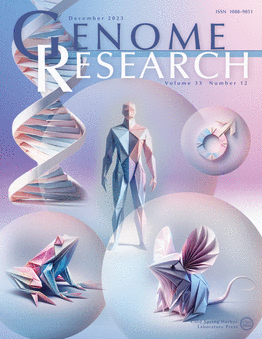Lambdoid phages with abundant Chi recombination hotspots reflect diverse viral strategies for recombination-dependent growth
IF 5.5
2区 生物学
Q1 BIOCHEMISTRY & MOLECULAR BIOLOGY
引用次数: 0
Abstract
Many phages encode recombination-mediating enzymes, but characterization of their roles in phage lifecycles is limited, and their impact on phage replication is controversial. To address these issues, we have searched for phages whose growth is impacted by the major recombination-promoting helicase-nuclease of Escherichia coli, the RecBCD enzyme. Although no phages inhibited by RecBCD are identified, growth of a newly isolated phage, named LLS, is enhanced by RecBCD. LLS's genome sequence reveals it is related to bacteriophage λ but encodes no recombination-promoting (Rec) proteins or associated RecBCD inhibitor. However, it contains an unexpectedly high number of Chi sites, activators of RecBCD-dependent recombination. Through analysis of 325 genomes of phages related to λ (lambdoid phages), we have found 71 other phage genomes that encode no Rec proteins but mostly possess large numbers of Chi sites. Conversely, phages encoding Rec proteins and a RecBCD inhibitor (collectively a Rec module) mostly lack Chi sites. Lambdoid phages of both diverse enteric bacteria and a pseudomonad have these properties. For this study, we thoroughly analyze the Rec modules of 246 lambdoid phage genomes. These analyses reveal a remarkable heterogeneity of Rec module protein types, both in sequence and in function, and allow us to identify phages that do not contain Rec modules. We conclude that phages lacking their own recombination systems have compensated by becoming enriched in Chi sites, enabling them to use the host's RecBCD to fulfill the requirement for recombination to efficiently replicate. This study highlights the importance of recombination for phage survival and the diversity of strategies to achieve it.具有丰富Chi重组热点的羔羊样噬菌体反映了重组依赖性生长的多种病毒策略
许多噬菌体编码重组介导酶,但它们在噬菌体生命周期中的作用的表征是有限的,它们对噬菌体复制的影响是有争议的。为了解决这些问题,我们寻找了受大肠杆菌中主要的促进重组的解旋酶核酸酶(RecBCD酶)影响生长的噬菌体。虽然没有发现被RecBCD抑制的噬菌体,但新分离的噬菌体LLS的生长被RecBCD促进。LLS的基因组序列显示它与噬菌体λ有关,但不编码重组促进蛋白(Rec)或相关的RecBCD抑制剂。然而,它含有意想不到的大量Chi位点,这些位点是依赖recbcd重组的激活剂。通过对λ (lambdoid phages)相关的325个噬菌体基因组的分析,我们发现了71个不编码Rec蛋白但大多数具有大量Chi位点的噬菌体基因组。相反,编码Rec蛋白和RecBCD抑制剂(统称为Rec模块)的噬菌体大多缺乏Chi位点。各种肠道细菌和假单胞菌的羔羊样噬菌体都具有这些特性。在这项研究中,我们深入分析了246个lambdoid噬菌体基因组的Rec模块。这些分析揭示了Rec模块蛋白类型在序列和功能上的显著异质性,并使我们能够识别不含Rec模块的噬菌体。我们得出结论,缺乏自身重组系统的噬菌体通过丰富Chi位点来补偿,使它们能够利用宿主的RecBCD来满足重组的要求,从而有效地复制。这项研究强调了重组对噬菌体存活的重要性,以及实现重组的策略的多样性。
本文章由计算机程序翻译,如有差异,请以英文原文为准。
求助全文
约1分钟内获得全文
求助全文
来源期刊

Genome research
生物-生化与分子生物学
CiteScore
12.40
自引率
1.40%
发文量
140
审稿时长
6 months
期刊介绍:
Launched in 1995, Genome Research is an international, continuously published, peer-reviewed journal that focuses on research that provides novel insights into the genome biology of all organisms, including advances in genomic medicine.
Among the topics considered by the journal are genome structure and function, comparative genomics, molecular evolution, genome-scale quantitative and population genetics, proteomics, epigenomics, and systems biology. The journal also features exciting gene discoveries and reports of cutting-edge computational biology and high-throughput methodologies.
New data in these areas are published as research papers, or methods and resource reports that provide novel information on technologies or tools that will be of interest to a broad readership. Complete data sets are presented electronically on the journal''s web site where appropriate. The journal also provides Reviews, Perspectives, and Insight/Outlook articles, which present commentary on the latest advances published both here and elsewhere, placing such progress in its broader biological context.
 求助内容:
求助内容: 应助结果提醒方式:
应助结果提醒方式:


